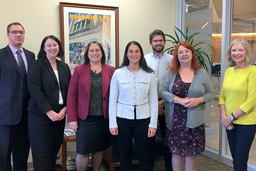The Milwaukee Justice Center Mobile Legal clinic was recently awarded the Wisconsin Innovation Award.
The mobile clinic, run by the Marquette Law School, the Milwaukee Bar Association and Milwaukee County, was honored for strong leadership and innovative ideas at a ceremony in Madison during the Forward Technology Festival.
The Marquette Law School has offered free legal clinics in several locations in Milwaukee, including the House of Peace and the Milwaukee court house, but the mobile clinics are able to reach people who may be unable to get to these permanent locations.
“We wanted to expand to as many parts of the city as possible,” said Assistant Dean for Public Service Angela Schultz. “The more locations that we are available at, the better chance there would be of people using this service.”
When the mobile legal clinic began 12 months ago, the goal was to expand the program to other locations in Milwaukee, making it more accessible. Twelve clinics in seven different locations were set up, giving the people who could not get to their services in the past a better location. These clinics would run 10 a.m. to 2 p.m. one Saturday a month.
The model being used for the mobile legal clinic is very similar to what’s been used for the non-mobile clinics in the past.
“We have a 14-year-old model where we have volunteer lawyers and the law students devoting their time to help people who need legal advice,” said Schultz. “We’ve just taken this model and in the last 12 months made it mobile.”
The clinics offer legal advice in family law issues, landlord problems, debit, credit and any sort of small claims, but do not handle any criminal law. The lawyers who work with the program are from the Michael Best and Friedrich LLP law firm, and all of them work on a volunteer basis in order to help people who may not be able to afford having an attorney. The program also brings in attorneys who specialize in certain conflict areas, such as divorce issues, who volunteer their time and come from several different law firms.
The mobile clinic differs in that attorneys and law students meet with clients at tables in a small bus, setup with a curtain and noise machines for privacy and attorney client privilege purposes.
The goal of the program is to partner with other services, like the YMCA, so they can establish themselves and inform the community.
“We wanted to partner with services that could tell other people about what we do,” Schultz said. “People who visited these establishments would then be able to get information about our program, thus informing the community of our service.”
This new service had some struggles, according to Schultz, who attributes them to the normal stutters of any new business.
“Throughout the 12 months, we’ve encountered many obstacles that come with this program,” Schultz said. “Like making the community aware and working with new technology as this program moves throughout the community.”
Technology and resources provided some shakeups, such as setting up and maintaining the vehicle used as the mobile clinic.
“We had to plan for the basic maintenance of the vehicle,” Schultz said. “Gas money, changing the oil, tire rotation.”
Schultz hopes to see the program expand in the near future, bringing needed legal advice to Milwaukee citizens who otherwise could not afford it.
“Our hope is to add one more day for people to use this service,” Schultz said. “Giving people an extra day on Thursday from 10 a.m. to 2 p.m. will give them more opportunities to use our service.”
Correction: A previous version of this article said the mobile legal clinic set up 12 clinics in 12 different locations that would run every Saturday. That has been corrected to say that the 12 clinics were set up in 7 locations, running only one Saturday a month.


